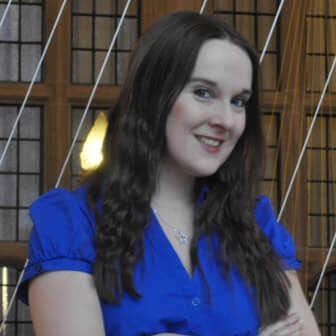I never met anyone who grew up wanting to be a careers adviser. I meet plenty of people with an ‘I had a terrible careers adviser who said I should be a fork-lift truck driver/ flower arranger/ circus performer’ story, but as for anyone who came straight out of school or university with their heart set on a career in careers… we’re yet to cross paths.
In fact, it took me a bit of time to find my way into this line of work. I was towards the end of the first year of my PhD when a bit of part-time work in my university’s student recruitment office and a spot of volunteering for an art gallery started to show me what post-PhD life could look like beyond academia. By the time my thesis submission came around, I was fully reconciled with the feeling that I’d taken academic research as far as I wanted to, and it was time to turn my hand (and my researcher brain) to something else. I didn’t even apply for academic jobs, even though a little voice still gnawed away in the back of my mind that this was something I ‘ought to do’. I was preparing to leave academia, not through the burn-out and disillusion that follows so many academic job hunts; instead, I had this deep-seated belief that academic research and teaching just weren’t the greatest uses of my ‘best bits,’ and I was eager to see what else I could throw myself into.
Hence, I was not expecting the sucker punches that came with the job-hunting process. I can’t remember how many interviews I had… 8, perhaps? Maybe 10? In truth, the jobs I was applying for were all blurring into one, and I was becoming more and more disillusioned. After being singled out as a ‘high achiever’ for much of my academic life, I now felt like I was stood on the edge of the abyss, afraid that after showing so much promise in my earlier life, I ultimately wasn’t going to amount to very much at all. It was a truly scary prospect that led me to cry into more than one espresso martini in the bars of Birmingham in 2011.
My PhD funding was due to run out in September 2011, and I’d been on-and-off looking for jobs since January of that year. Where I got any feedback at all from those interviews, it all had a similar theme, saying things like ‘Holly came across a little too “academic”’ and ‘we questioned whether Holly actually wanted this role due to her previous experience and ambitions.’ I was super-confused. I didn’t want to be ‘an academic’, but somehow I was still coming across as one? Even though I had said in my applications that I was now seeking roles in arts administration/ marketing/ charity work, my audiences still seemed to be thinking ‘why is she here going for our job when she quite clearly wants to be doing something academic?’.
I didn’t fully know what to do next, but I knew something had to change. In the end, it was more out of exhaustion rather than any kind of strategy that I decided to focus my job-hunting efforts a bit more narrowly. Up until then I’d been taking a scattergun approach, firing off applications for any job that sounded vaguely interesting (or that had the words ‘arts’ or ‘adviser’ in it) – chucking things at a proverbial wall and waiting for something to stick. Things started to turn a corner when I began asking myself a simple set of questions, if I was going to turn my PhD into my ideal job:
– What aspects of it would I want to keep?
– What bits would I want to lose?
– And what would I want to add to it that I don’t get at the moment?
Keep – lose – add.
Still today, this remains one of the most popular ‘tools’ I use in my career guidance work to get PhD researchers to start thinking positively about their priorities for their next career steps. Here’s what this threw out for me:
I wanted to still be supporting students in some way and to be seen as an adviser and an expert.
I also knew that ideally, I still wanted to be in a university environment, surrounded by smart people
2) I knew I wanted to lose the isolation I felt in humanities academic research.
Spending so much time on my own amongst books had started to wear me down.
I also wanted to lose the sense of working on something esoteric that few people really understood
3) In so far as what I wanted to add, the main things were: more contact with a wider range of people in my work;
a better sense of work/life separation; and I felt like I wanted to have an impact on students that would go beyond their academic work and their subject area.
This simple thought experiment of ‘keep/lose/add’ was useful to me in three main ways:
Firstly, it helped me to understand that I wasn’t trying to solve my entire life with my first post-PhD job. My first job wasn’t an end goal, it was just a next step. A way of losing some of the things I wanted to lose, adding a few things I wanted to add, the first step in the iterative process of ‘career,’ in which I would refine my professional life over time to come increasingly more in line with my priorities
Secondly, it helped me tell a more convincing story to potential employers as to why I was in front of them going for their job. Embarrassing really; after all those years studying English Literature and narrative theory, when it came to job-hunting I hadn’t even considered the importance of getting my own story straight. Sure, I’d told employers that I didn’t want to continue in academia, but I hadn’t really told them a convincing story about why I now wanted to work for them in that particular role. As a result, they knew what I didn’t want to do, but they didn’t know what I did want to do, and how they fitted into that.
Finally, it showed me that as well as the things I wanted to change about my work by moving beyond academia, the things I wanted to keep were just as important. In fact, it turned out that some of these themes (being in front of an audience of students, advising, helping etc.) united many of the things I’d found myself drawn to throughout my career thus far, not to mention the kinds of things that I would most commonly use as ‘productive distractions’ from doing my research!
Looking back on my ‘keep/lose/add’ results now, it’s not difficult to see how they ultimately led me to a career in careers. I didn’t get there straight away though; let’s not forget the good 4 years where I earned marginally more than I had on my PhD stipend in admissions and recruitment-based roles that felt way more marketing-and-sales-y than I was comfortable with.
My main advice to you though, if you’re still in the throes of your PhD, is to do this thought experiment sooner and more consciously than I did. The sooner you start thinking about what you want to keep/lose/add to your PhD to make it into your ideal job, the sooner you’re able to strategically seek out opportunities to develop in those ways, and the sooner you’re able to start researching career options that will help you keep what you want to keep, lose what you want to lose, and add what you want to add. And the sooner you’ll be able to construct a convincing narrative for employers that says yes, up until now I’ve been doing XXX in academia, but what that’s taught me is that I now want to focus on applying my skills, strengths, and qualities in XYZ to making an impact in this different field.
Now, with ten years of work under my post-PhD belt, here’s a message from the other side. Yes, when it comes to ‘leaving academia’ there’s a lot of reflection and letting go to do… but it’s all part of the process of remaking yourself into a professional that you’ll look back on and be proud of.




